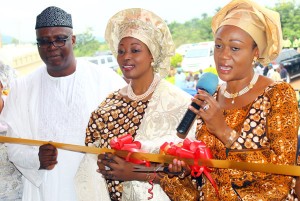 Senator Oluremi Tinubu,representing Lagos Central, yesterday, said words were inadequate to express the grief and shock the death of the Deputy Governor of Ekiti State, Mrs. Funmilayo Olayinka, caused her.
Senator Oluremi Tinubu,representing Lagos Central, yesterday, said words were inadequate to express the grief and shock the death of the Deputy Governor of Ekiti State, Mrs. Funmilayo Olayinka, caused her.
In a statement issued from her constituency office in Yaba, Lagos State, Senator Tinubu described the late Deputy Governor as a sister who never compromised her deep commitment to progressive ideals.
Recalling the hope spurred by Mrs. Olayinka’s demonstration of strength and prayerful disposition during her last visit to the late Deputy Governor, Senator Tinubu said her demise was a big loss to the generality of the womenfolk in Nigeria.
She said: “It was very unpleasant news that fills one with a heavy heart. My heart goes to her aged parents, husband and children as well as the Ekiti State Governor, First Lady, the people of Ekiti State and many others who feel the grief of this irreparable loss.
“She led a productive and focused life. Her advocacy for women’s rights, social justice and genuine development marked her out as a true progressive. Beyond that, she was such a sweet, gentle soul who ardently believed that we can reform our society for the common good.
“I believe that her gentle soul is now resting in the bosom of the Lord. May God strengthen all those she left behind.”
Aged 52, Mrs. Funmilayo Olayinka succumbed in the battle against cancer at St. Nicholas Hospital in Lagos on Saturday evening.
Senator Tinubu has been working with others towards rallying against the increasing prevalence of cancer among Nigerian women.
At the Breast Cancer Symposium organised by the Breast Cancer Association of Nigeria, BRECAN, in Ibadan last October, Tinubu counselled government, NGOs and other stakeholders to devote more effort towards sensitising women against the increasing rate of cancer across Nigeria.
She said: “From available statistics, in 2008 breast cancer accounted for the death of about 458,503 women worldwide. This figure has been on the increase ever since.
“It has also been reported that survival rate for the people diagnosed with breast cancer in developing countries, including Nigeria, is very poor compared to countries in the developed world.
“In Nigeria, breast cancer is the leading cause of death amongst women aged 35-55 years. It affects at least 116 out of 100,000 women in a year.
“The effect is more devastating if we consider the significant roles women play in the society as wives, mothers, breadwinners and contributors to our national economic growth. The cost of the death of one woman as a result of breast cancer goes beyond the immediate expenses on treatment, which is quite expensive.
“Over the years in Nigeria, breast cancer awareness has been on the rise, but the efforts made are still not enough since our women in the rural communities are yet to be educated on the importance of this preventable fatal occurrence if detected early enough.
“Medically, as we have been informed, breast cancer as a disease cannot be totally eliminated, at least, until more is known about the genetic component of it, which will give us the right clues for intervention at the molecular level.
“The key to reducing this terrible disease and its effects on our people is early detection through regular screening.”
This article was first published in The Vanguard
Last modified: April 9, 2013
